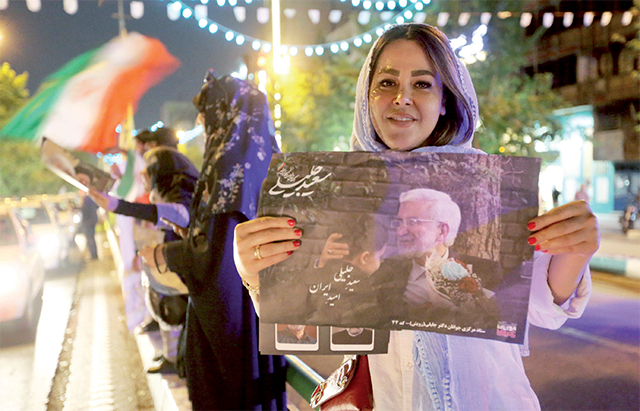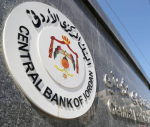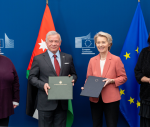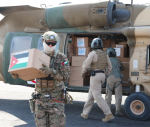You are here
Iran’s parliament: What you need to know
By AFP - Feb 16,2020 - Last updated at Feb 16,2020
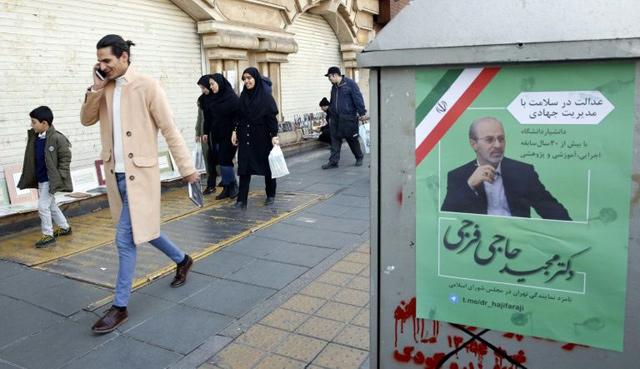
Iranians walk past an electoral poster of a candidate of the upcoming parliamentary elections on a street in Tehran on February 12, Iranian candidates for the parliamentary elections allowed to begin campaigns from Thursday for elections scheduled on February 21, 2020 (AFP photo)
TEHRAN — Conservatives are expected to make a resurgence on next Friday when Iranians elect a new parliament, a legislative chamber that shapes debate in the Islamic republic.
Voters will also choose replacements on February 21 for deceased members of the Assembly of Experts, a clerical body responsible for appointing and monitoring Iran's supreme leader.
Here is a look at the role of the parliament in the Islamic republic:
What is the Iranian parliament?
Iran has some institutions and many officials appointed by the supreme leader, Ayatollah Ali Khamenei, but the parliament and Assembly of Experts are elected directly by the people.
The parliament, known officially as the Islamic Consultative Assembly, drafts legislation, ratifies international treaties and approves the national budget.
Five seats are guaranteed for religious minorities: One for Zoroastrians, one for Jews, one for Assyrian and Chaldean Christians and two for Armenian Christians.
The parliament, also known as the Majles, passes legislation before it is forwarded to the Guardian Council and president for approval.
It also has the authority to question and approve would-be ministers and presidents.
Elections are held every four years for 290 seats, while the 88 members of the Assembly of Experts are elected every eight years.
Seven of the assembly's members have died in the past four years, resulting in next Friday's by-election.
The assembly generally has a low profile, but Khamenei is 80 years old and it would be its task to pick his successor after he dies.
Who gets to vote?
Every Iranian above the age of 18 and holding a valid identity card can vote in elections.
Candidates can campaign for a week up until 24 hours before the election begins.
Polling stations open at 8:00 am (04:30 GMT) on Friday and close 10 hours later, but voting can be extended if deemed necessary by the authorities.
Who approves candidates?
The Guardian Council, which is dominated by ultra-conservatives, is a powerful body that oversees Iran's elections.
It is made up of six clerics appointed by the supreme leader and six lawyers selected by the judiciary.
The council is allowed to vet election candidates and can prevent them from running.
For this election, it has disqualified more than half of the 14,444 candidates who sought to stand, including dozens of mostly moderate and reformist incumbents.
President Hassan Rouhani, whose alliance fears losing its majority in the poll, warned of threats to Iran's "democracy and national sovereignty" following the disqualifications.
Who is running?
The candidates are traditionally from two general political movements in Iran: Reformists and conservatives.
This time, however, after the disqualification of 7,296 would-be candidates, the main competition will be between conservatives and ultra-conservatives.
The conservatives are gathered around former Tehran mayor Mohammad Bagher Ghalibaf, who defines himself as a "technocrat".
They publicly supported the 2015 nuclear deal between Iran and world powers.
The ultra-conservatives are hardliners who call themselves "revolutionaries". They rejected the nuclear deal and oppose any negotiations with the West.
How are factions aligning?
It is customary for Iran's two main political factions to present a "list" of candidates.
Both appear divided in this election.
The reformists denounced the impossibility of a "fair" contest in more than 70 per cent of constituencies and said they would be unable to present a joint list for Tehran, in an unprecedented move.
They suggested they were not in a position to put forward 30 candidates known to the general public.
But the reformist newspaper Sazandegi announced on Sunday that a reformist party it backs has put together a list for the capital.
That list is comprised of unknowns, however, and the initiative comes from a single reformist party.
On the other hand, the "principalists" — or conservatives — appear to have too many approved candidates to choose from for a united front.
Topping one of their main lists in the capital is Ghalibaf, a three-time presidential candidate, former police chief and member of the Revolutionary Guards, as well as Tehran mayor from 2005 to 2017.
Yet, fighting between conservatives and ultra-conservative factions has so far prevented them from presenting a single united list.
Related Articles
TEHRAN — Iran's newly formed parliament on Thursday elected former Tehran mayor Mohammad-Bagher Ghalibaf as its speaker, consolidating the p
TEHRAN — Conservatives took a lead Saturday as the first results of Iran's parliamentary election came in, boosted by a predicted low turnou
TEHRAN — Two ultraconservative candidates have pulled out of Iran's Friday presidential vote, leaving four contenders including one reformis



